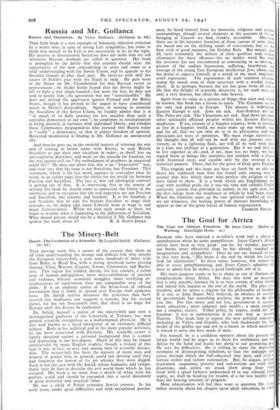The Misery-Belt
Quest: The Evolution of a Scientist. By Leopold Infeld. (Gollancz. 12S. 6d.) THIS moving work lifts a corner of the curtain that shuts us off from understanding the strange and difficult folk who inhabit the European misery-belt, a zone some hundreds of miles wide from Baltic to Black Sea, with a strong westward curve passing through Vilna, Warsaw, Cracow, Lwow, Czernowitz and Bucha- rest. This region has yielded, during the last century, a richer crop of human unhappiness, more mass-exhibitions of passion and violence, bitterer economic struggles, more terrifying re- crudescences of superstition than any comparable area of the globe. It is an endemic centre of the brain-fever of inflated nationalism that is liable to spread over Europe with epidemic force. Dr. Infeld neither discusses the processes that have created this madhouse nor suggests a remedy, but his record shows, for the ten thousandth time, that there is no hope for Europe until the disease be eradicated.
Dr. Infeld, himself a native of the misery-belt and now a distinguished professor of the University of Toronto, has won general scientific recognition as a mathematical physicist. He is also well known as a lucid interpreter of an extremely difficult subject. Both in his technical and in his more popular activities, he has been associated with Einstein. His scientific career is lightly sketched against a personal background that is sombre and depressing to the last degree. Much of this may be almost unbelievable by many English readers, though a history of this type is not, in fact, so very rare among men of scientific distinc- tion. The misery-belt has been the nursery of many men and women of genius who, in general, could not develop until they had forgotten the horror of the pit whence they were digged. Such is not the case with Dr. Infeld, whose humanity and sympa- thetic style fit him to describe the evil world from which he has escaped. His book is no more than a sketch of what, with his powers, could and should be expanded into a social document of great historical and practical value.
He was a child of Polish orthodox Jewish parents. In his early teens, under great difficulties and with exceptional persist- ante, he freed himself from his domestic, religious and cultural surroundings, though several elements in the account of his up. bringing at Cracow we find, frankly, incredible. Moreover, there are in his narrative breaches of those canons of taste which are based not on the shifting sands of convention, but on that firm rock of good manners, the Golden Rule. But morals, after all, have commonly the defects of their qualities and, making allowances for these offences—for no milder word fits the the reviewer has not encountered so convincing or so moving a picture of the endless frustration, suffering, heartbreak, and courage of the young East European intellectual Jew, aflame with the desire to express himself, in a world of the most exquisitele
cruel repression. The experiences of such sensitive creatures stamp the mood even of their successes with a wistful melan. choly. It is, perhaps, because the joy has gone from all else in life that the delight of scientific discovery is, for such men, not only a very heaven, but often the only heaven.
Apart from its value as a picture of things that exist and should
be known, this book has a lesson to teach. The Germans are not the only sick people in Europe. The disease is widespread. Eastern Europe is sick. Jews are sick. Anti-Semites are sick The Poles are sick. The Ukrainians are sick. And there are many other spiritually afflicted peoples within the Eastern European madhouse. If we, citizens of a happier country, wish to continue to live in a happier world, we must make up our minds, one and for all, that we can only do so as its physicians, and wise physicians are wary of optimism. We must resign ourselves to the thought that all will not be well with our patients after a victory, as by a lightning flash, nor will all be well with then in a year, nor perhaps in a generation. But if we and they are to live together at all—and, if not, man has no hope, we must regard them as beings like ourselves but stricken with a disease with historical roots and curable only by the reversal of an historical process. There, but for the grace of God, goes England This tragedy and this hope are here set forth by an able and brave but saddened man who has found only among men of science that love which those who profess the religion of love have failed to show. It is a book which any Englishman mar read with justified pride, for it was the sane and catholic English university system that provided its author, in his 34th year, with the first refuge from the madhouse in which he had been reared. When the historian sums up the vast spiritual conflict of which we are witnesses, the healing power of abstract knowle.dge will appear as one of the great forces of human regeneration.
CHARLES SINGER.


































 Previous page
Previous page